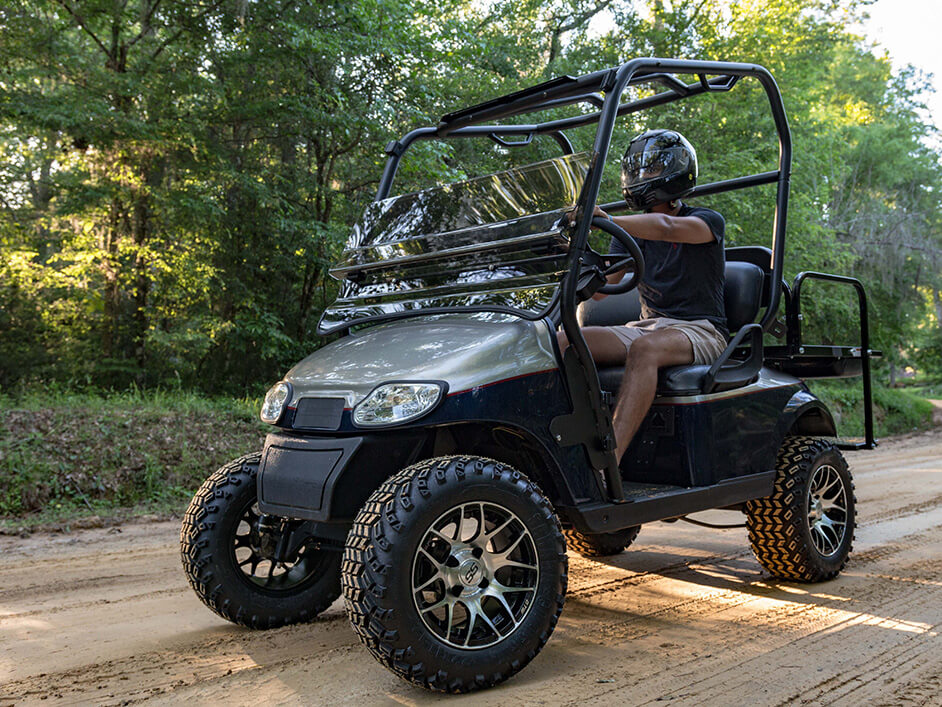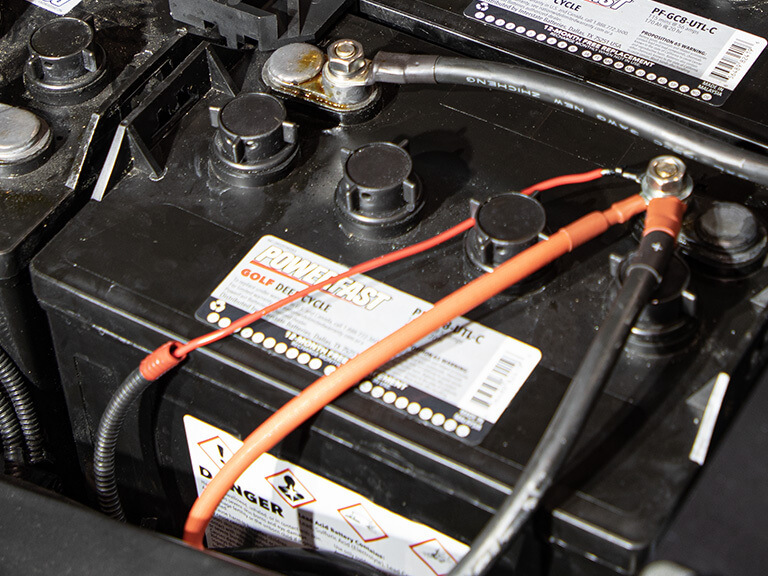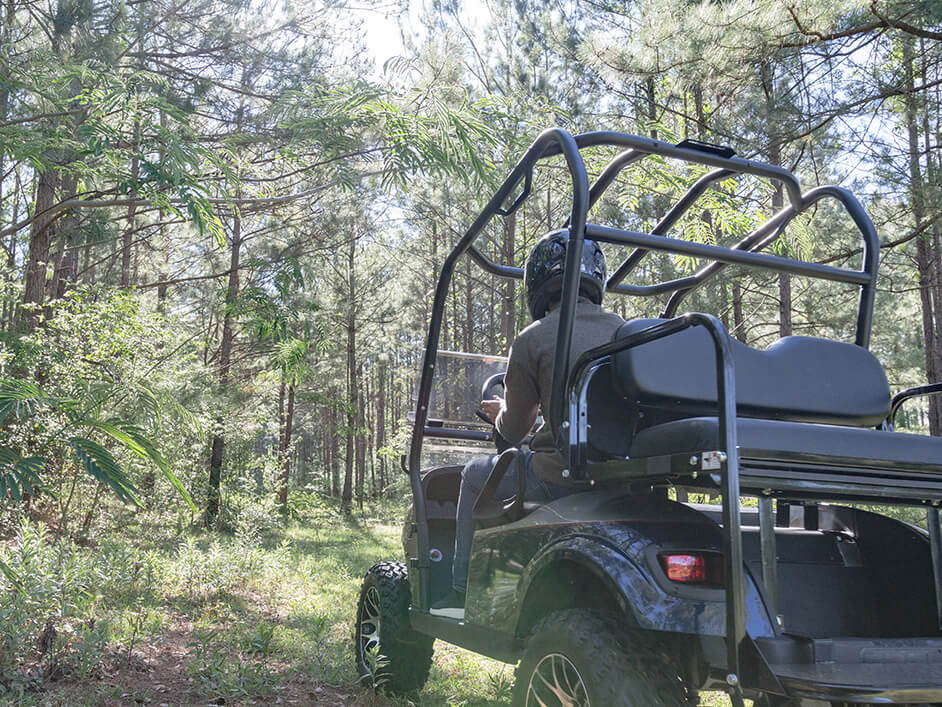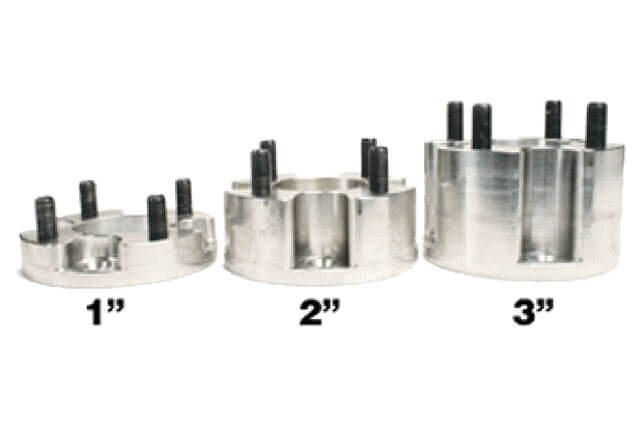Buying a new cart can be confusing. Choosing between the big three (E-Z-GO, Yamaha, Club Car) is exciting—and important. Now, it’s time to pick a fuel source: gas or electric? They both get you where you’re going, so it’s important to know what’s best.
A little history
Almost a century ago in Clearwater FL, the first “golf cart” was made. It was powered by two caddies pulling the riders. Since then, things have gotten way, way better—and a lot more fun, too.
By the fifties, carts were powered by electricity and closely followed by gas options as well. Although gas may not be as popular, it certainly has its benefits. They’re both a blast to drive and can make life a lot easier.
Pros and cons of electric vs gas golf carts
One has more power. One costs less to fuel. One can go farther, and one can go faster. There are a lot of factors to consider. Below, you’ll learn everything you need to know to make the right choice.To break it down, we’ve put together some quick lists:
Pros of a gas golf cart
- Offroad Handling. Rocky terrain and tougher trails are hard on your cart—especially if it gets stuck. Gas carts are much better suited to the offroad riding that many of our readers enjoy. Still—that doesn’t mean it can handle everything. Whether gas or electric, if you’re out on the trails, find yourself a winch to make sure you’ll always make it back on-time. Get one today.
- Range. A gas cart has a range of about 100 miles, making it an ideal choice for golf cart owners with larger properties or farther to travel. Additionally, you can always bring a gas can wherever you go—the same can’t be said for a battery charger.
- Power. As far as torque, payload, and horsepower are concerned, gas is king. This makes them ideal for chores, work, and play. With a beefier powertrain, there’s more options for what you can do.
Cons of a gas golf cart
- Cost. As everyone knows, the market for new or used vehicles is always changing. On average though, a gas-powered golf cart is going to cost $700-$1000 more than an electric. In addition, gas prices aren’t going down any time soon, so fuel costs are a factor.
- Limited use. More and more state parks, trails, golf courses, etc. are banning the usage of gas carts. It’s important to check your local regulations before you buy.
- Emissions. Gasoline engines are a major contributor to climate change, and the runoff from engines can seep into the ground, polluting the places you like to ride.
- Noise. For residential or use on the links—but especially for the hunters out there—silence is golden. Noisy gas golf carts could disturb your trophy buck before you even get to the deer stand.
Pros of an electric golf cart
- Speed. Right off of the lot, an electric cart should be able to do about 19 mph, and 10 mph for used fleet carts. Gas models are a touch slower, with a governor at 15mph installed automatically. So, if you need to go fast—skip the gas. Buying electric also means you can overhaul the battery output with a controller/conversion system to take it up another notch. Find what you need to upgrade your electric cart’s performance here.
- Eco-Friendly. An all-electric vehicle produces zero emissions, and is the better option for the environment. State-by-state, the laws vary as well. Buying electric means you can go more places.
- Wallet-friendly. On top of the $1K or so price difference between gas and electric, they typically cost less to operate. No gas, no oil changes, and less hassle. What you see is what you get.
Cons of an electric golf cart
- Range. As batteries get better and better this is becoming less of a problem. But realistically—they only get about half (or less) miles of operating time on a full charge compared to gas models.
- Convenience. There’s a gas station in just about every town in America—but not that many places to recharge your cart. If you get stuck 30 miles away from home with no extra battery, you’re just out of luck.
- Off-roading. On the course, the road, or a well-maintained trail, electric carts do just fine. When it gets a little rocky, a little hilly, or a little bumpy however, some riders get a little worried. Electric engines aren’t as good at powering over obstacles. If you’re taking your cart offroad, you’re going to want to upgrade the suspension and tires.
Where you ride matters
Just like in real estate, it’s all about location, location, location. One kind of cart may work better for where you live, and one type of cart may work better for where you play. Here are some thoughts about how gas and electric carts measure up in different locations.
Best carts for the course
Have you ever missed a putt because of a distraction? We have too. Gas golf carts are noisy, and aren’t a top pick of most on the links. Typically, you only need to cover eighteen holes of play— range isn’t much of a worry. Chances are, the cart paths are fairly well-maintained as well—taking away that issue. So, unless you’re planning on hauling a trailer or have a really bad slice that keeps you in the woods, the most popular play is an electric cart.
Ideal carts for your neighborhood
Depending on your local regulations, you may not have a choice. Some communities only allow electric carts for various reasons, but some neighborhoods have hills and other obstacles that need a gas cart with more oomph uphill. What it comes down to is regulations and range. Before buying, ask yourself how far you need to go and check your local regulations.
Electric vs. gas for the farm or ranch
If there’s no pavement for miles, no outlet to charge, and the day’s only half-over, almost every Buggies Garage fan would agree—you’ve got to go gas. Having the extra payload capacity and range is huge when you’re using your cart for work. Until electric carts catch up in these areas, gas is going to be the best choice for the field.
Choosing a golf cart for camping
In heavily wooded areas, you need reliability. When you can’t find a campsite with electric plugins, you might not even get to ride more than once or twice during your trip. A gas-powered golf cart is not only more capable on the trails, but it’s not reliant on the electrical grid.
The best rides while camping also add a little excitement to the trip, by taking on more challenging terrain. A lifted suspension, wheels, and meatier tires are usually the first picks of experienced owners who are taking their carts out for vacation.
Gas vs. electric carts: who wins?
Every driver desires something different. One rider may need the speed and silence of an electric, and another could care less—they’re just looking to have some fun out on the trails. It really comes down to what the need is and what the buyer is really looking for.
The best part about golf carts—they’re customizable. No matter which way you go, there’s a way to get more out of your machine. Whether that’s more fun, more miles, more speed, or more utility, you’re sure to find the right parts and accessories for the job here. Upgrade your ride today.






Comment section